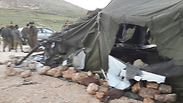All those who wished for Israel's defense establishment to treat "Jewish nationalistic crimes" in the same way as it does Palestinian terrorism, can tell themselves with some satisfaction that on Monday night it finally happened. The demolition of the illegal structures at Yitzhar by security forces is the implementation in the West Bank, slowly but surely, of the same policy of deterrence used to fight rocket fire from Gaza.
The repeated slashing of tires on vehicles belonging to the IDF brass by the rioters at Yitzhar was greeted with the same action that is designed to cause the most pain to terrorist targets – demolition of their homes. The action is intended to both deter and change the rules of the game.
It's still too soon to know if this policy of deterrence, the brainchild of Defense Minister Moshe Ya'alon, will have the desired effect. It's not unreasonable to say it won't. The settler hilltop youth and their supporters, those nationalistic criminals, will keep up their relentless "price tag" attacks against the IDF and Palestinians, given that their motivation is in no way lessened by physical punishment.
It is a motivation nourished by ideology, religion and mysticism combined with hormonal adventurism, and has no shortage of people handing out moral support. Far-right extremist Itamar Ben Gvir and his friends are teaching them how to keep shtum in police investigation rooms, and as a result all efforts at policing and punishment, which have even been stepped up of late, are not achieving their intended goals. At the very most, there has been a slight drop in the number of mosques being torched.
What is happening at Yitzhar is far more worrying and far more serious. If they hadn't slashed the tires of the Shomron Brigade commander two days ago, it would have been possible to see this as a "minor nationalistic crime". But the story of Yitzhar is one of rebellion against the rule of law and Israeli sovereignty. This is no longer a case of sporadic activity, but rather violent and premeditated resistance to the enforcement of the law and to public order.
The Yitzhar rioters had two objectives - preventing the demolition of illegal structures, and traumatizing senior government officials and the public into not even thinking about evacuating settlements as part of an agreement with the Palestinians.
We are no longer talking about tactical deterrence that radical settlers attempted to achieve through "price-tag" attacks on Palestinians, but rather strategic policy against the government during a sensitive period of peace talks, in which the government might dare to make painful concessions to the Palestinians. The riots were carried out not only by residents of Yitzhar, but also hilltop youth-affiliated radicals from Jerusalem and other settlements. They acted in line with a preprepared protocol. Yitzhar is only the tip of the iceberg, the vanguard, and it has the entire radical settlement movement behind it.
This rebellious settlement has exacted a heavy price from us in two central fields:
A violent response by the defense establishment will not help. Punishment, no matter how justified, will only increase zealots' motivation and they will find ways to keep up their activities regardless. The only ones who can stop nationalistic criminals are the settlers themselves, and primarily their leadership. Instead of quietly scorning them from television studios, Samaria Regional Council head Gershon Mesika and the settlers' parliamentary lobby should block the transfer of funds to Yitzhar. They must launch a public campaign and enlist the prominent rabbis to put a stop to this phenomenon.
The defense establishment and IDF for their part must also change their tactics – from "governmental price tags" against the settlers, to more sophisticated and non-violent operations intended to nip provocations in the bud. Acting violently will only lead to more violence by radical zealots.
The police and IDF need to put Yitzhar under partial curfew – those residents who want to leave and go about their business are welcome to, but any person the IDF thinks is planning to set Palestinian fields on fire should be stopped. There will not be even one solitary illegal structure built when such activity ends in arrest and interrogation.
It is safe to assume that an IDF response of this nature would lead to a massive influx of radical activists to Yitzhar. Thus, police forces need to be prepared for an initial wave of riots that would then die down as time passes. Coupled with support from settlement leaders, a show of strength and resilience by security forces will allow them to achieve their goal, and after some time order will be restored and the residents of Yitzhar will understand they are not lords of the land.

















